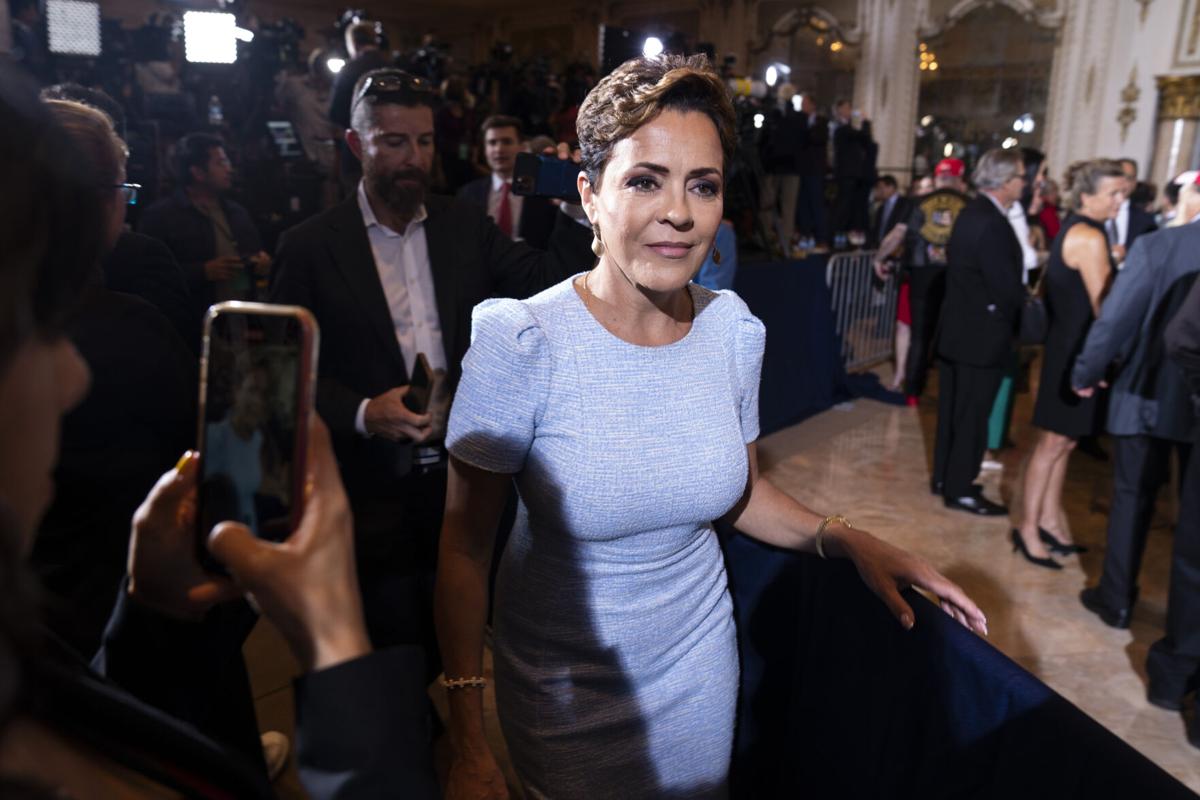PHOENIX — An attorney for Kari Lake is trying to use math to prove his contention that hundreds of thousands of early ballots were counted without the signatures being verified.
Kurt Olsen told Maricopa County Superior Court Judge Peter Thompson that records show that more than 264,000 ballots were processed at the rate of less than three seconds apiece. He said 70,000 had their signatures checked, on average, every two seconds.
“That’s not signature review,’’ he said Wednesday, the first day of what could be a three-day trial as Lake challenges the November election results in which she lost the governor’s race. He said county election officials, who were monitoring the activities of the verifiers, knew what was happening.
“The evidence will show either that the signatures were not reviewed at all or that the signature verifiers were simply clicking through the computer screen and moving on to the next ballot without doing any cross-reference to the record signature,’’ Olsen said.
People are also reading…
None of that may help the losing GOP candidate in her quest to have the election results tossed out, in which she lost by 17,117 votes to Democrat Katie Hobbs.
That’s because Thompson said Lake’s case is built not on a claim that any particular ballot should not have been counted, but on her contention that no signature verification was performed. The judge pointed out that claim was undermined by the fact that Lake’s witnesses included people who were reviewers who, while testifying about conditions, avowed that they, themselves, actually were checking signatures and rejecting those that did not match.
That came into focus with the testimony of Jacqueline Onigkeit, called to the stand by Olsen.
After a tearful explanation that she signed up to be a verifier “for my children and five grandchildren, I want their vote to count,’’ Onigkeit detailed the training she went though and the process she used to determine if signatures were valid.
She then talked about reviewing signatures and finding some that were good and some that were not. Onigeit said she focused on quality, not the quantity of signatures she was processing.
“So did you perform your duty?’’ asked Jack O’Connor, a deputy Maricopa County attorney who is defending the county’s counting of votes.
“Yes I did,’’ she responded.
There was similar testimony from Andrew Myers, who did basic signature review in the 2022 primary and then was elevated to a Level 3 reviewer, someone who, confronted by ballot envelope signatures that did not match the records, tried to “cure’’ the problem by contacting voters. Here, too, O’Connor asked if he thought he did a good job.
“I think I did,’’ Myers said.
The other key piece of evidence Lake’s legal team presented was a video clip, taken from a camera inside the vote tallying room, that showed two workers at computer screens. One appeared to be simply clicking through signatures.
“He’s clicking through them at a rate of less than three seconds per image, not conducting any signature review at all,’’ Olsen told the judge. By contrast, he said, the other person was taking time, scrolling the screen up and down to make actual comparisons.
“This isn’t a question of not getting it right,’’ Olsen said. “It’s simply they are not physically capable of reviewing the signature, both from the standpoint of being able to do an assessment with the respect to the procedures but also with respect to the functionality of the computer.’’
But Tom Liddy, another deputy Maricopa County Attorney, told Thompson none of that helps Lake’s case. If nothing else, he said, it shows that one of the two people was doing his job.
And the other? “That individual was then taken off the line,’’ Liddy said.
Plus, he said, there’s no evidence the other 153 reviewers were not doing their jobs.
Bryan Blehm, another of Lake’s attorneys, tried a different tactic.
He said some people believe there should be requirements for identification when ballots are submitted while others are OK with simply a signature on an envelope. So Blehm questioned Rey Valenzuela, Maricopa County’s elections director, about whether he believes it is important to ensure that early ballots actually come from those whose names are on the envelopes.
Thompson, however, said Valenzuela’s personal beliefs about the level of identification for early ballots are irrelevant.
The judge said it is the Legislature and not the court that sets the rules for early ballots. And so far, lawmakers have not adopted identification requirements for early ballots.
Thompson alreadyruled that if Lake wants to overturn the election results she needs to prove not only that “no signature verification or curing’’ occurred ¯ something her own witnesses appear to have undermined — and that the county “had systematically failed to materially comply with the law.’’
“This is, of course, in addition to the requirement that she prove that this alleged complete failure to conduct signature verification resulted in a change in the outcome of the gubernatorial election,’’ Thompson said.
The judge said that must be shown by “competent mathematical basis’’ — something that refers to the outcome and not whether a certain number of signatures can be verified — and not simply a claim “that the result of the 2020 race might have been different.’’











